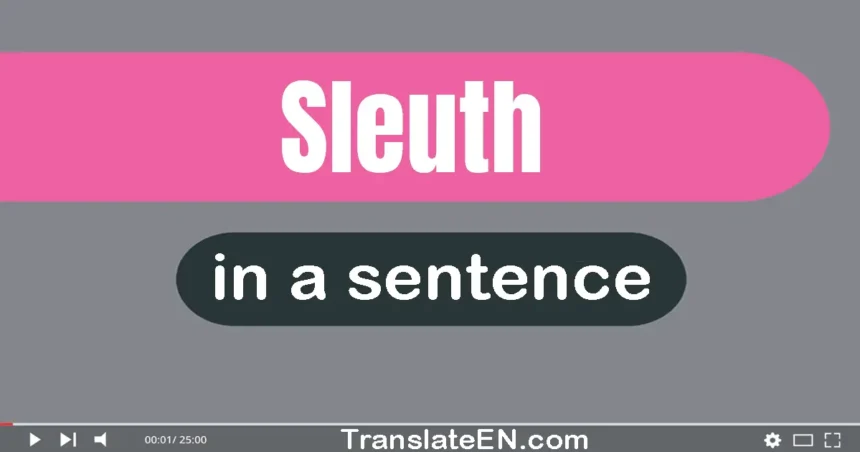When you write, your goal isn’t just to share ideas; it’s also about conveying them in the clearest, most effective way possible. This is where the art of “Sentence Sleuthing” becomes crucial. Sentence sleuthing is a skill that involves digging deep into your text to uncover and correct errors that can muddle your messages. This guide will walk you through the essentials of sentence error identification, error detection, and proofreading techniques to enhance your writing precision and grammar mastery.
What is Sentence Sleuthing
Sentence sleuthing is more than a simple spell-check. It involves a detailed review of your writing to identify errors that affect its clarity, impact, and professionalism. These errors can range from grammatical mistakes to issues with sentence structure and clarity. Mastering sentence sleuthing not only enhances the readability of your work but also ensures that your message is conveyed accurately. Writing precision is essential for maintaining credibility and professionalism in any field. Whether you’re a student, a professional writer, or someone crafting an email, mastering this skill can significantly improve your communication
The Importance of Error Detection
Error detection is the first step in the sentence sleuthing process. It requires a keen eye for details and a good understanding of grammar and style conventions. Common mistakes include grammatical errors, punctuation missteps, and stylistic inconsistencies. By learning to spot these errors efficiently, you can prevent misunderstandings and make your writing more persuasive and engaging.
Common Types of Writing Errors
Before diving into the techniques of sentence sleuthing, it’s important to understand the common types of writing errors. Here are a few categories you should be aware of:
- Grammatical Errors: These include mistakes in verb tense, subject-verb agreement, punctuation, and sentence fragments. Mastering grammar is the first step in error detection.
- Spelling Errors: Misspelled words can undermine your credibility. Spell-check tools can help, but they are not foolproof.
- Punctuation Errors: Misplaced commas, incorrect use of apostrophes, and other punctuation mistakes can change the meaning of your sentences.
- Syntax Errors: These involve the arrangement of words and phrases to create well-formed sentences. Poor syntax can lead to confusion and misinterpretation.
- Logical Errors: These occur when there is a flaw in the argument or the flow of ideas, making the text unclear or illogical.
Proofreading Techniques
Effective proofreading techniques are essential for sentence error identification. Here are some strategies to help you catch and correct errors:
- Read aloud: Proofreading your work out loud will enable you to see mistakes that you might overlook if you read silently. This technique can highlight awkward phrasings and missing words.
- Take a Break: After writing, take a break before proofreading. This will enable you to approach your work with clarity and new perspectives.
- Print It Out: Reviewing a printed copy of your work can make it easier to spot errors than reading on a screen. Use a highlighter to mark mistakes.
- Focus on One Type of Error at a Time: Instead of trying to catch every mistake in one go, focus on one type of error (e.g., grammar, punctuation) at a time. This makes the process more manageable.
- Use Technology Wisely: Tools like grammar checkers can help identify obvious errors but don’t rely on them completely. They often miss nuances that the human eye can catch.
Techniques for Sentence Error Identification
To become proficient in sentence error identification, practice the following techniques:
- Break Down Sentences: Analyze each sentence individually to ensure it is grammatically correct and logically sound. Look for subject-verb agreement, proper use of modifiers, and correct punctuation.
- Check for Consistency: Ensure that your writing is consistent in terms of tense, point of view, and style. Inconsistencies can confuse readers and weaken your message.
- Eliminate Redundancies: Remove unnecessary words or phrases that do not add value to your writing. Concise writing is more effective and easier to read.
- Verify Facts and References: Ensure that any facts, figures, or references included in your writing are accurate and properly cited.
- Revise for Clarity: Make sure your sentences are clear and easy to understand. Stay cautious of jargon and extremely complicated language that could confuse your readers.
Grammar Mastery
Achieving grammar mastery is a critical aspect of sentence sleuthing. Here The following advice can help you become a grammar expert:
- Learn the rules of grammar. Learn the fundamentals of grammar. There are many resources available, including grammar books, online courses, and websites dedicated to grammar education.
- Practice Regularly: Like any skill, grammar mastery requires regular practice. Write frequently and seek feedback from peers or mentors to improve your skills.
- Keep a Grammar Guide Handy: Having a reliable grammar guide on hand can be invaluable when you encounter tricky grammar questions.
- Learn from Mistakes: Pay attention to the types of errors you frequently make and take steps to correct them. Keep a list of common mistakes and review it regularly.
- Engage with Professional Content: Reading well-written content by professional writers can help you internalize proper grammar and style. Analyze how they structure sentences and use grammar effectively.
Advanced Proofreading Techniques
For those looking to take their sentence sleuthing to the next level, consider these advanced proofreading techniques:
- Reverse Reading: Read your text backward, sentence by sentence. This forces you to focus on each sentence in isolation, making it easier to spot errors.
- Use Multiple Proofreaders: If possible, have multiple people proofread your work. Different perspectives can help identify errors you might have missed.
- Set Specific Goals: When proofreading, set specific goals for each session. For example, focus on improving sentence structure in one session and on punctuation in another.
- Create a Checklist: Develop a proofreading checklist made according to your common mistakes. Use this checklist every time you proofread to ensure you don’t overlook any errors.
- Proofread in Stages: Divide your proofreading into stages, addressing different aspects of your writing in each stage. This systematic approach can improve the thoroughness of your error detection.
Advancing Writing Precision
Writing precision involves choosing the right words and constructing sentences that clearly express your intent without ambiguity. To improve your writing precision:
- Be Concise: Eliminate unnecessary words or phrases that don’t add value to your statements.
- Use Active Voice: Active voice makes your writing stronger and clearer by showing who is doing what.
- Focus on Word Choice: Select words that precisely convey your thoughts and emotions.
The Role of Sentence Error Identification
Sentence error identification is crucial for polishing your text. This involves not only finding grammatical mistakes but also ensuring that each sentence is clear and effective. Practice makes perfect here. Spend time learning common grammatical errors and how to fix them. The more you practice, the better you will get at spotting these issues in your writing.
Also Read : SEO Best Practices: The Bedrock of Digital Visibility
Mastering Grammar Mastery
Grammar mastery is not about knowing complex rules; it’s about understanding how words fit together to make clear and correct sentences. Improve your grammar by:
- Reading Widely: Reading books, articles, and other well-written material can expose you to correct usage and diverse writing styles.
- Studying Basics: Revisit the basic rules of grammar from reliable sources or take advantage of online courses and workshops.
- Practice Regularly: Use exercises and quizzes to regularly test your grammar knowledge.
Final Thoughts
Sentence sleuthing is an invaluable skill in any writer’s arsenal. It’s about more than just finding and fixing mistakes—it’s about refining your text to convey your message in the most effective way possible. Remember, error detection, proofreading techniques, writing precision, sentence error identification, and grammar mastery are all part of this important process.
By honing these skills, you can ensure that your writing is not only error-free but also impactful and clear. Keep practicing these techniques, and soon you’ll find that sentence sleuthing becomes a natural and rewarding part of your writing process.
Frequently Asked Questions
1. What is Sentence Sleuthing?
Sentence Sleuthing refers to the meticulous process of examining your writing to identify and correct errors that can undermine its clarity and effectiveness. It involves detailed error detection and correction to enhance communication.
2. Why is error detection important in writing?
Error detection is crucial because it helps maintain the credibility and professionalism of your writing. Identifying and correcting errors ensures that the message is conveyed clearly and accurately, preventing misunderstandings and misinterpretations.
3. Can you recommend some effective proofreading techniques?
Effective proofreading techniques include reading your text aloud to catch awkward phrases, using digital tools like spell checkers judiciously, taking breaks before proofreading to gain a fresh perspective, and printing out your text to review it in a different format.
4. How can I improve my writing precision?
To enhance writing precision, focus on being concise and clear. To strengthen and clarify your phrases, use the active voice. Additionally, carefully choose words that precisely convey your intended meaning and avoid vague language.
5. What are some tips for achieving grammar mastery?
Achieving grammar mastery involves regularly engaging with well-written content to observe proper grammar in use, revisiting and studying grammar rules, and practicing with grammar exercises and quizzes to reinforce your understanding and application of grammatical concepts.










